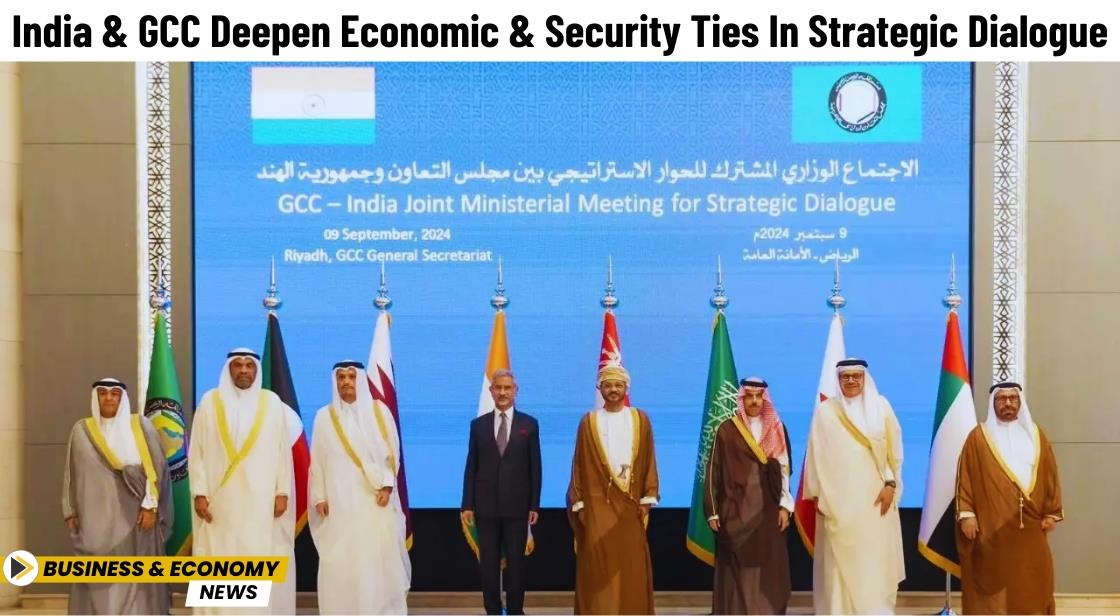India and GCC Deepen Economic and Security Ties in Strategic Dialogue

News Synopsis
India and the Gulf Cooperation Council (GCC) have entered a significant new phase in their diplomatic relations following a historic meeting on September 8, 2024. India's External Affairs Minister, Dr. S. Jaishankar, participated in the first-ever India–GCC Joint Ministerial Meeting for Strategic Dialogue held in Riyadh. This landmark event, co-chaired by Qatar’s Prime Minister and Foreign Minister, Sheikh Mohammed bin Abdulrahman Al Thani, marks a pivotal moment in India’s engagement with the Gulf region.
India-GCC: A Relationship Built on Strong Foundations
The Gulf Cooperation Council (GCC) is home to nearly 8.9 million Indian expatriates, forming the largest diaspora from any country in the region. This community not only plays a crucial role in the local economies but also in India’s economy, sending billions of dollars in remittances each year. The deepening of India-GCC relations is a natural progression of geographic proximity, shared economic interests, and strategic concerns. The first structured India-GCC Political Dialogue was initiated in 2003, laying the groundwork for stronger cooperation in key areas such as energy security, trade, and welfare of the Indian diaspora.
Since then, India and the GCC have expanded their partnership beyond just trade and investment, also covering security cooperation, technology partnerships, and cultural exchange. These ties were further institutionalized with the Memorandum of Understanding (MoU) on the Mechanism of Consultations signed in September 2022, establishing an annual framework for discussions between India’s Ministry of External Affairs and the GCC-Troika.
Key Milestones in India-GCC Relations
In March 2023, both parties reached another milestone with the first India-GCC Senior Officials Meeting held in Riyadh. This event provided an essential platform for discussing various issues, ranging from economic collaboration, trade, and security, to newer areas such as digital infrastructure and climate change. The progress made during this meeting bolstered mutual trust and laid the foundation for the historic Joint Ministerial Meeting in September 2024.
Strong Trade and Energy Partnerships
The GCC has solidified itself as one of India's most important trading partners. Bilateral trade between the two reached an impressive $161.59 billion during the 2023-24 fiscal year, with over $105 billion in imports, primarily consisting of oil and gas. The Gulf region supplies 35% of India’s oil and 70% of its natural gas needs, reflecting the deep economic interdependence between the two regions. However, India’s outlook toward the GCC goes beyond energy. The recent meeting emphasized efforts to strengthen investment partnerships in sectors like green hydrogen, clean energy, and advanced technologies.
With initiatives like Saudi Vision 2030 and the UAE’s Vision 2031, Gulf nations are undergoing significant economic transformations. These changes present opportunities for India, particularly as it focuses on diversifying its energy sources and investing in sustainable development projects.
Joint Action Plan 2024–2028: Boosting Cultural and Academic Collaboration
During the Strategic Dialogue, India and the GCC also agreed on a comprehensive Joint Action Plan for 2024–2028. This plan aims to advance cooperation in academic and scientific fields, fostering collaboration between universities and research institutions in both regions. The plan includes specific programs to enhance cultural ties, allowing for scientific research, cultural exchange, and educational partnerships. The GCC Secretariat will coordinate the implementation of this Joint Action Plan.
Growing Defense and Security Cooperation
In addition to economic and academic collaboration, defense and security cooperation between India and the GCC has grown significantly. Both sides share a common vision for regional stability, especially as the broader Middle East and South Asia experience geopolitical shifts. India has conducted joint military exercises like Al Nagah with Oman and Zayed Talwar with the UAE, reflecting their shared strategic interests. This enhanced security cooperation underscores the commitment of both regions to safeguarding regional peace and stability.
The Human Element: Indian Diaspora’s Role in Strengthening Ties
Central to this growing relationship is the Indian diaspora, which comprises 66% of all non-resident Indians (NRIs). Recognized for their hard work and significant contributions to the development of GCC nations, the Indian community acts as a bridge between cultures and economies across the Arabian Sea. Their presence not only supports the region’s economic growth but also fosters cross-cultural understanding and people-to-people ties.
You May Like









